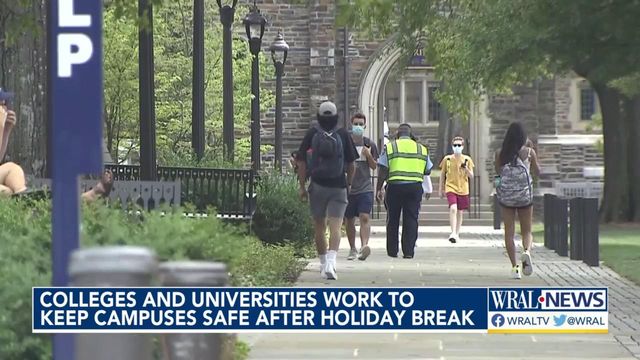Local universities prepare ahead of expected omicron surge
Colleges and universities are planning ahead for the expected omicron surge.
Posted — UpdatedThe students who spoke with WRAL News said they are exhausted, but they understand what could come in the next few weeks.
The last two years have been anything but normal.
"It doesn’t feel like the college experience at all. I didn’t feel like I was in college. I don’t think the education quality is as good if you’re not on campus,” said Delaney Edge, UNC-Chapel Hill senior.
The University of North Carolina at Chapel Hill is not requiring vaccinations or boosters for the spring semester. The university is requiring that all students be tested for COVID-19 before returning to campus after winter break.
Edge is fully vaccinated and on board with UNC’s changes.
“I think it is the best way, because people are still acting like it’s normal even though we’re in different times,” said Edge.
Students will have to take a PCR test within 72 hours before their return to campus and upload the results online. If students receive a positive result, they will not be allowed on campus.
"A lot of people are, perhaps, going to test positive, and some, certainly a percentage of them, are going to have symptoms that might make it difficult for them to do their job either in residence or even at home, so we have to come up with a strategy," he said.
Dr. David Wohl with UNC said more testing is not what is needed. What is needed is more efforts getting people boosted.
“I think many of us are going to get infected with omicron, and the vast majority of us will not get sick,” said Wohl. “At some point we’re just going to have to say 'testing asymptomatic people – it’s just not going to be a good idea' if we want to have people in school and people in our healthcare system and people playing on hockey rinks and football fields.”
Duke also announced changes.
University leaders said after consulting with public health specialists, they decided that the spring semester should start online.
"We have faced these uncertainties and challenges before, and, thanks to your dedication, we have been able to continue our vital missions of education, research and service to society. Now we must do so again," Duke University Provost Sally Kornbluth said in a statement.
All classes will be held remotely from Jan. 5 to Jan. 8.
In-person instruction is expected to resume on Jan. 10, officials said in a statement.
Six cases of the latest COVID-19 variant, omicron, were confirmed in Durham County this week.
Campbell University is also requiring all unvaccinated student be tested before arriving on campus.
NC State will continue with their weekly testing requirements for all unvaccinated students who live on campus.
“I hope we stay in person. I hope omicron doesn’t get too out of hand, because this is a beautiful campus. It’s a great place to go to school," said Edge.
• Credits
Copyright 2024 by Capitol Broadcasting Company. All rights reserved. This material may not be published, broadcast, rewritten or redistributed.





